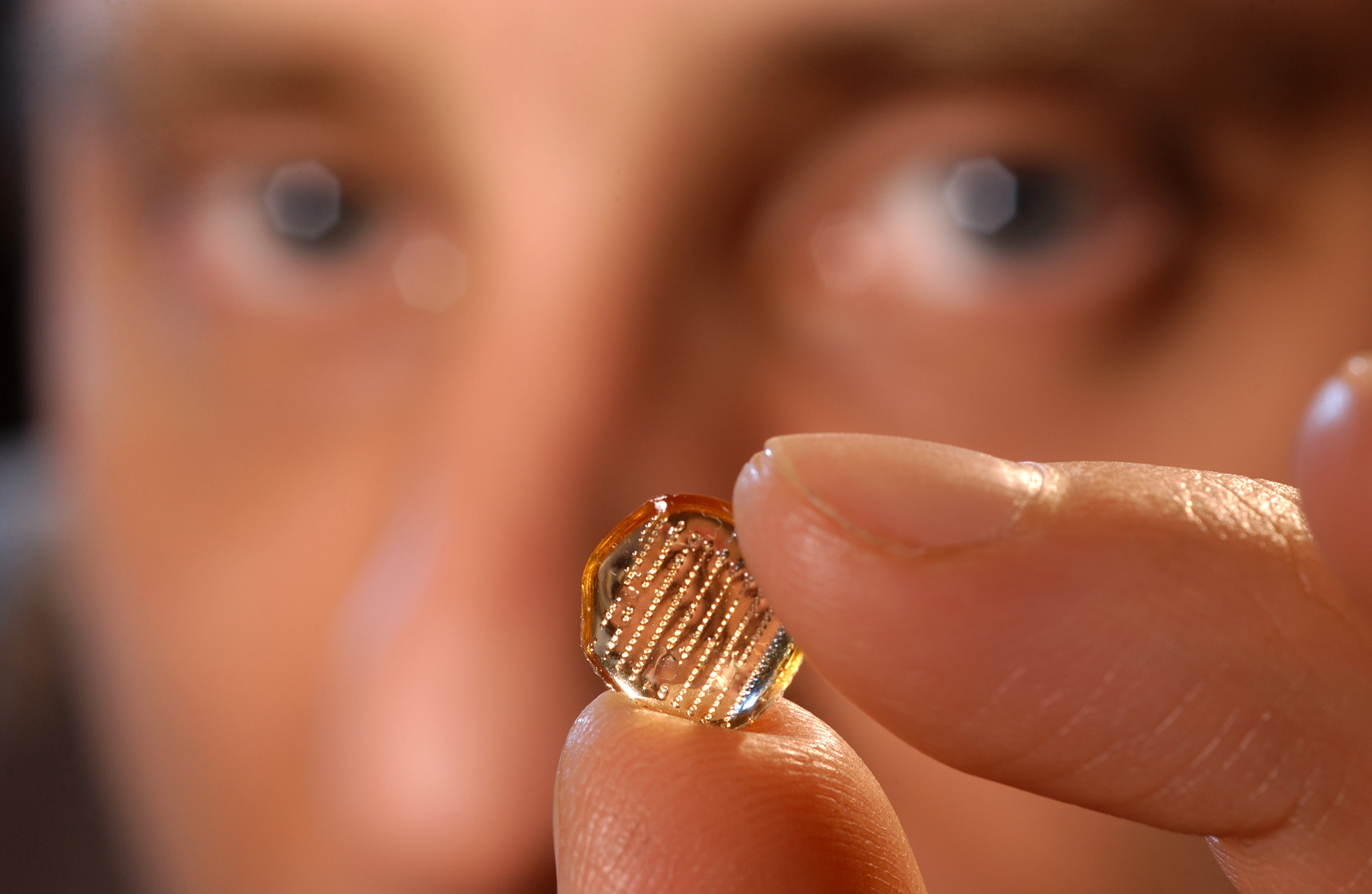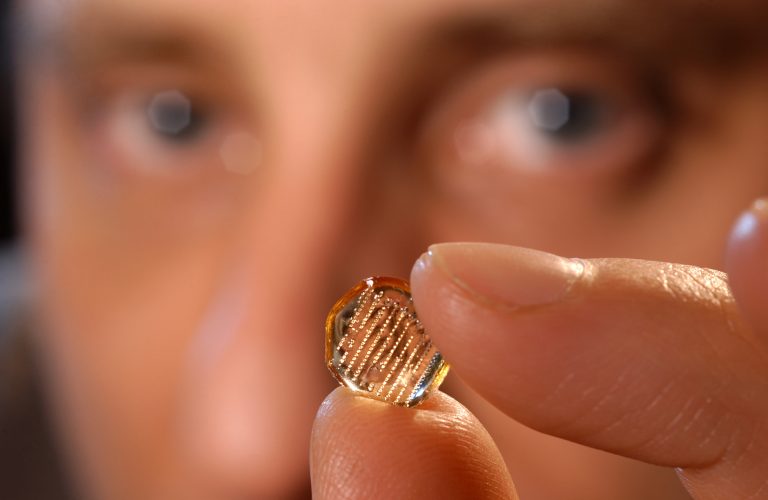
A phase I clinical trial conducted by Emory University in collaboration with the Georgia Institute of Technology has found that influenza vaccination using Band-Aid-like patches with dissolvable microneedles is safe and was well-tolerated by the study’s participants. According to the Emory News Center, the patch was as effective in triggering immunity against influenza and was strongly preferred by participants over vaccination with a needle and syringe.1 The microneedle vaccine is expected to reduce costs because it is self-administered, can be transported and stored without refrigeration and easily disposed after use.1 2
According to Mark Prausnitz, PhD, senior co-author of the study published in The Lancet and Georgia Institute of Technology’s professor of chemical and biomolecular engineering:
One of the main goals of developing the microneedle patch technology was to make vaccines accessible to more people. Traditionally, if you get an influenza vaccine you need to visit a health care professional who will administer the vaccine using a hypodermic needle. The vaccine is stored in the refrigerator, and the used needle must be disposed of in a safe manner. With the microneedle patch, you could pick it up at the store and take it home, put it on your skin for a few minutes, peel it off and dispose of it safely, because the microneedles have dissolved away. The patches can also be stored outside the refrigerator, so you could even mail them to people.1
Between June and September 2015, 100 participants between the ages of 18-49 years old were enrolled and randomly assigned into the following four groups: 1. Vaccination with microneedle patch given by a health care provider; 2. Vaccination with microneedle patch self-administered by study participants; 3. Vaccination with intramuscular injection given by a health care provider; 4. Placebo microneedle patch given by a health care provider.3 The study’s findings reveal that the microneedle patches were safe, skin reactions were mild and antibody responses using the patch were similar to that of the group vaccinated through intramuscular injection.3
The Global Center for Medical Innovation manufactures the patch and is investigating using the technology for other vaccines, including for polio, measles, mumps and rubella.2 4
Further Investigation Required on the Safety of the Microneedle Patch
Although the study claims that the microneedle is safe to use, there are several unanswered questions regarding its safety that need further investigation. The first issue is with respect to the study’s sample size—a sample of100 participants is too small to ensure reliability and validity of the results. Larger clinical trials are required for credible results. Additionally, the age range of the sample does not include children and elderly participants, the groups to which the flu vaccine is marketed to the most.
Secondly, the tiny needle-like points on the patch are said to dissolve into the skin; however, the substances/ingredients that the needles are made of is not known. In fact, it is also unknown whether the microneedles dissolving into the body has a long-term, negative effect on human health. Furthermore, the long-term effect of repeated exposures and whether or not there is a harmful synergistic effect when the patch interacts with ingredients in other vaccines.
Serious Implications for the Self-Administered Microneedle Patch
According to the authors of the study, one of the main benefit of the influenza microneedle patch is that it is self-administered without the need for a healthcare professional. Nadine Rouphael, MD, Associate Professor of Medicine at Emory University and lead author of the study says:
Despite the recommendation for adults and children to receive a flu shot, many people remain unvaccinated. Dissolvable microneedle patches could potentially simplify the delivery of influenza vaccines. We found that the vaccine was stable outside the cold chain, meaning that it could potentially be stored on a pharmacy shelf. The patch could also be safely applied by participants themselves, meaning we could envisage vaccination at home, in the work place, or even via mail distribution. These advantages could reduce the cost of the flu vaccine and potentially increase coverage. Our findings now need confirming in larger trials.5
While it may appear that the microneedle patch is convenient because it can be used without the presence of a healthcare professional, there are serious implications to self-administration. Self-administration eliminates the assessment and screening phase of the recipient’s medical history by a healthcare professional prior to receiving the microneedle patch thus creating a potentially dangerous situation for the recipient. Moreover, once the person has administered the microneedle patch on himself or herself, there is no supervision by a medical professional following the administration should the recipient experience an adverse vaccine reaction. Self-administration of the patch removes medical professionals as the middleman; therefore, reducing costs relating to labor, storage, etc.—all of which benefits the vaccine industry.
References:
1 Woodruff Health Science Center. Microneedle patches for flu vaccination prove successful in first human clinical trial. Emory News Center June 22, 2017.
2 Ramsey L. A pain-free ‘microneedle’ patch could one day replace flu shots. Business Insider June 28, 2017.
3 Rouphael NG et al. The safety, immunogenicity, and acceptability of inactivated influenza vaccine delivered by microneedle patch (TIV-MNP 2015): a randomized, partly blinded, placebo-controlled, phase 1 trial. The Lancet June 27, 2017.
4 Voice of America. New Vaccination Method Protects Against Influenza. VOANews.com July 8, 2017.
5 EurekAlert. The Lancet: Dissolvable microneedle patch for flu vaccine found to be safe and preferred in first-in-human trial. EurekAlert.org June 27, 2017.













8 Responses
I foresee a whole shitload of problems with this. You people are total ass hats!
The upside is without healthcare practitioners to monitor administration, I can buy the vaccine, get checked off for compliance, toss it in the trash without using it and I don’t have to have to have the annual vaccine refusal argument in order to earn my living, and I don’t have to wear a mask for half the year.
If they start monitoring administration because of people like me, any of the savings will be wiped out and then we’re back to the same old hassle. But we might have a short period of rest from the vaccine wars. I might pay $10 for the opportunity to scam the system and take a breather from the battle.
As I was reading the article I had the exact same thought as you!
My thoughts exactly, Zuto!
Will there be no end to the “creativity” of these evil elites( otherwise known as the controlling scum at the top )?
Language, Catryna. And which people?
What came to my mind right away is if companies start using this method. Who would just slap this on to someone’s arm. It dissolve in a minute and the damage is done. There would be no time to consent to a vaccine and most wouldnt know it was a vaccine.
“the substances/ingredients that the needles are made of is not known”
WHAT? How can something like this be approved? We can’t know the ingredients of a vaccine?? Oops. I forgot. This is the sick, weird world of vaccine pushers, where efficacy and safety are irrelevant.